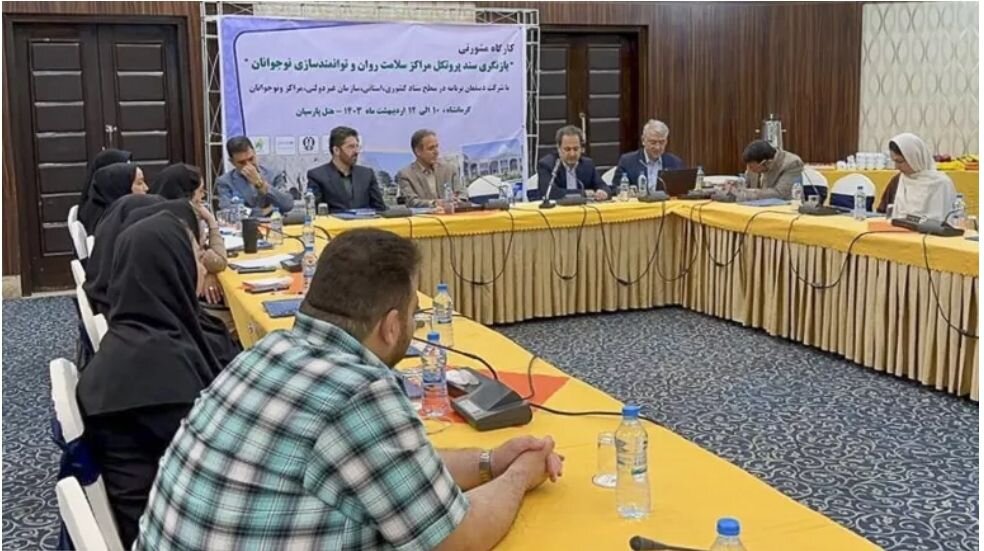Services in adolescent empowerment centers to be enhanced

TEHRAN – Adolescents Well-being and Empowerment Centers, known as MASERRAT, in Mashhad and Kermanshah cities have revised and reviewed their protocols to make sure the adolescent girls receive the most efficient and high-quality services.
In 2022, the United Nations Children’s Fund (UNICEF) in collaboration with the anti-narcotics headquarters and the Anti-Narcotics Coordination Council, supported the establishment of two pilot Adolescent Girls Psychosocial Wellbeing and Empowerment Centers in Mashhad and Kermanshah, with a focus on social harms reduction and prevention of drug use among at-risk adolescent girls.
Adolescent girls aged 10-19 who are participating in well-being and empowerment programs supported by UNICEF will benefit from a significant improvement in the quality of services provided, the UNICEF website reported on May 6.
These changes resulted from a consultative workshop to review and modify the protocols.
The protocols include a wide range of procedures and measures based on which services such as healthy lifestyle, psychological health support, social and life skills, increased meaningful participation, prevention from drug abuse, social harms, and risky behaviors, as well as increased resiliency and self-care.
In this workshop, held from April 29 to May 1, participants from UNICEF, anti-narcotics headquarters, provincial drug control coordination councils in Kermanshah and Khorasan Razavi along with representatives of teenage girls and local service provider NGOs discussed the existing protocols’ developments and challenges.
So far, 2,900 teenage girls have benefited from well-being and empowerment support in these two centers, supported by both UNICEF and the anti-narcotics headquarters.
In the next step, the revised protocols will be finalized and after the approval of the anti-narcotics headquarters and provincial drug control coordination councils, it will be communicated to the centers in Kermanshah and Khorasan Razavi, for implementation.
In May 2023, experts, social workers, psychiatrists, and outreach volunteer peers of two centers in Kermanshah and Mashhad were trained on the provision of more efficient services to adolescents in a workshop organized jointly by UNICEF, the anti-narcotics headquarters and Khorasan Razavi Provincial Anti-Narcotics Coordination Council.
The four-day workshop, held in Mashhad from May 21-24, 2023, was aimed at addressing the technical needs of the staff who work closely with at-risk adolescent girls and enhancing their capacity, knowledge, and skills in the referral of adolescents to the centers.
The training included self-care skills, effective communication, considerations on working with adolescents with special needs, including refugees, as well as mapping and planning for outreach.
It also included sessions on advocacy, an important aspect of a successful community-based approach.
UNICEF's recent services
Following the destructive floods that hit Sistan-Baluchestan province in February, UNICEF has been actively engaged in providing essential aid to the affected communities mainly women and children.
Funded by the European Civil Protection and Humanitarian Aid Operations (ECHO), UNICEF procured 2900 essential hygiene packs including 2000 household hygiene kits, 300 baby kits, 500 Menstrual Hygiene Management (MHM) kits, and 100 incontinence kits to prevent disease outbreaks and promote children’s overall well-being, the UNICEF website reported on April 30.
UNICEF has also delivered ten water tankers and over 3 tons of perchroline powder to the affected areas, ensuring access to safe drinking water. This has also been materialized through generous funding of ECHO.
As part of UNICEF’s humanitarian response to the flood-affected communities in Sistan-Baluchestan, children and families in the affected villages of Dashtiari district will receive 2900 hygiene packs.
The UNICEF supported the delivery of 564,000 doses of Pneumococcal Conjugate Vaccine (PCV) for the prevention of pneumococcal-related infections and deaths among children in Iran.
The measure was adopted in support of the introduction of PCV in the national childhood immunization program in the country, the UNICEF website reported on March 17.
The consignment was the first shipment of PCV to the country, using Iran's financial resources left over from the procurement of COVID-19 vaccines, and delivered in collaboration with the Ministry of Health and Medical Education of the Islamic Republic of Iran, through UNICEF procurement services.
The shipment arrived from India and landed at Tehran’s Imam Khomeini International Airport on March 17.
The Ministry of Health and Medical Education intends to introduce two new vaccines into the national childhood immunization program namely, PCV and Rotavirus vaccine.
UNICEF will support the Ministry of Health throughout the introduction and delivery phases of these two new vaccines targeting pneumonia and diarrhea among children, the two infections that cause substantial childhood illness and deaths.
MT/MG
Leave a Comment